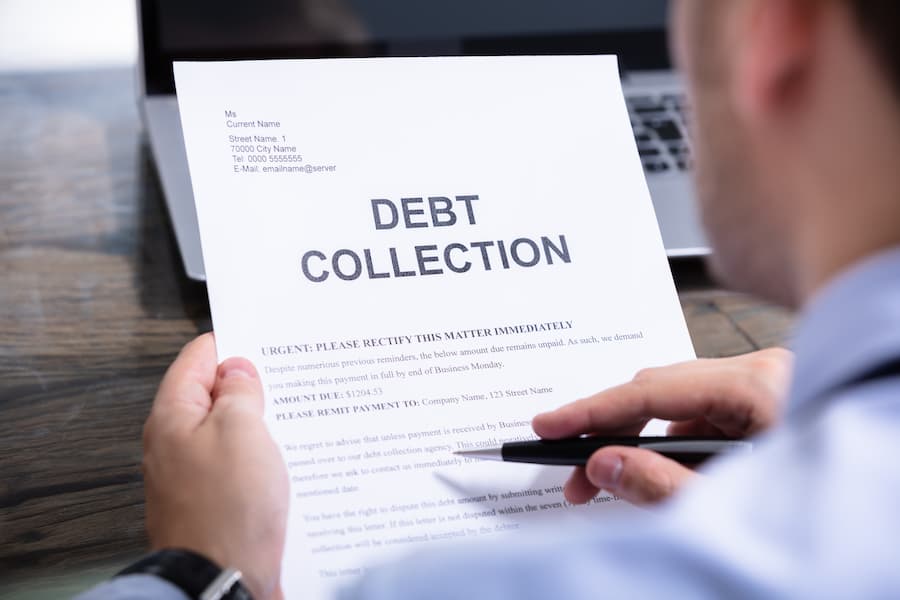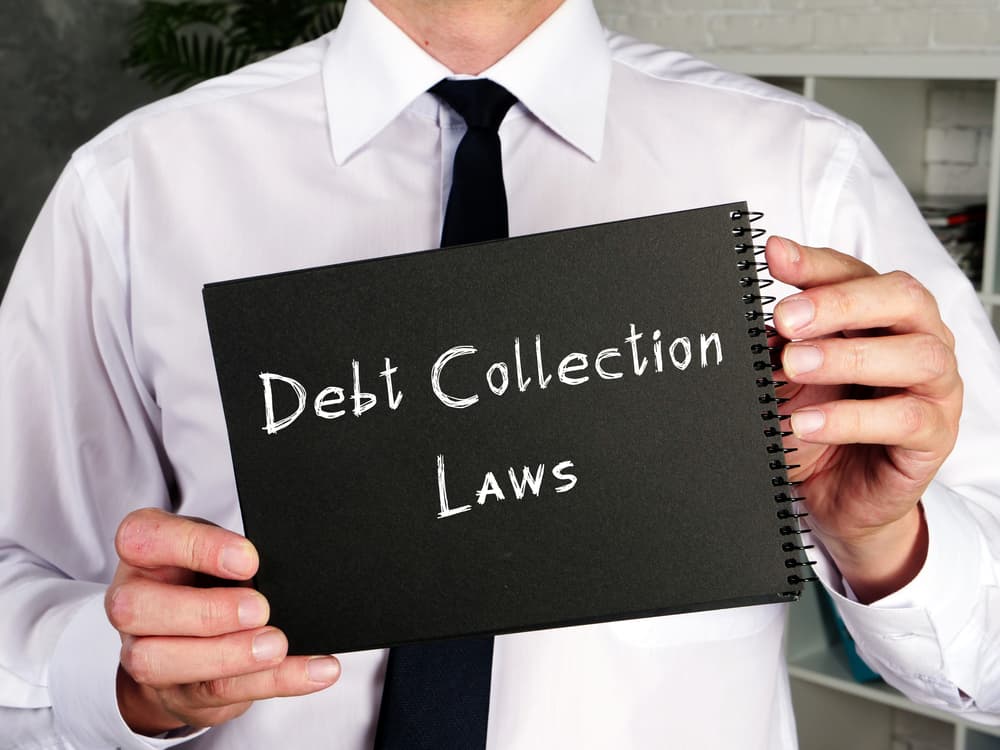When a commercial debt collection agency threatens your business, it can feel like a dark cloud is about to pour rain on your company, which could put your hard-earned reputation at risk.
Commercial debt law is complex. Confusion over state and federal laws mixed with aggressive collection tactics can overwhelm even the most experienced business owners.
Effectively leveling the playing field will protect your business's interests, keep your doors open, and allow you to continue to focus on your customers.
This guide will explore your rights as a business owner, effective negotiation techniques, and the legal boundaries within which debt collectors must operate.
If your business is facing pressure from a commercial debt collection agency, don't let a debt collector threaten your business or your livelihood. Consult with a skilled debt collector harassment lawyer to protect your business and your assets.
What Is Commercial Debt Collection?

Commercial debt, also known as business or corporate debt, is any financial obligation incurred by a business.
It's a common aspect of running a business, often used for:
- Funding day-to-day operations.
- Acquiring assets or expanding business operations.
- Investing in new ventures or projects.
Businesses often increase their debt during economic growth periods to invest in infrastructure and equipment, facilitating expansion.
Conversely, in recessions, they typically reduce debt, scale back investment, or may default on payments.
According to the latest figures, business debt has reached a record high, accounting for 74 percent of the U.S. GDP, with corporate debt alone nearing $10 trillion.
Unlike consumer debt, which is incurred by individuals for personal, family, or household purposes, commercial debt is strictly business-related.
It's not just the large corporations that deal with commercial debt; small businesses and startups often rely on loans and credit lines to fuel their growth and manage cash flow.
Many small businesses like restaurants, run on tight budgets. When unforeseen events like a pandemic illness happen, businesses can fall behind on loans and other debts.
Some businesses may start to use credit cards as a means to pay for employees, equipment, supplies, or other expenses.
When businesses fall behind, creditors and bill collectors can unlawfully demand payment by harassing business owners.
Commercial debt collection involves a unique set of challenges that differ significantly from consumer debt collection.
When a commercial debt collection agency targets your business, you don’t have to throw in the towel. You have rights and protections as a business owner.
Many abusive collection agencies hope that you quietly agree to their demands and just pay up. Knowing what to do (and what not to do or say), can save you time, money, and your business.
How Commercial Debt Collection Agencies Operate
When a business is unable to meet its debt obligations, creditors may turn to commercial debt collection agencies.
These agencies are tasked with recovering the owed amounts. They operate under a specific legal framework, and they are subject to different regulations than those collecting consumer debts.
The typical process followed by these agencies includes:
- Initial Contact. They will likely start with calls or letters to inform you of the debt and request payment.
- Demand Letters. Formal letters outlining the debt amount and the deadline for payment.
- Negotiation. They may offer options for repayment, such as payment plans or settlements.
- Legal Action. If other methods fail, the agency may initiate legal proceedings to recover the debt.
How Can a Business Use the Law for Protection?
While the Fair Debt Collection Practices Act (FDCPA) offers extensive protections to consumers, its provisions do not typically extend to businesses.
However, this doesn't mean that businesses are without recourse. Various state laws may offer some level of protection against abusive collection practices.
If your business struggles with commercial debt and faces pressure from collection agencies, consult a knowledgeable debt harassment lawyer for valuable guidance and support.
Don't hesitate to reach out for a consultation to protect your rights and business interests.
How to Respond to Commercial Debt Collection Agencies
When your business faces debt collection efforts, the initial response can significantly impact the outcome. The following are some ways to handle the situation effectively.
Verify the Debt
First, ensure the claimed business debt is accurate. Review your financial records and confirm:
- The amount the agency claims your business owes.
- The creditor to whom the debt is owed.
- Any previous communications or agreements related to the debt.
Mistakes can occur, and sometimes they erroneously attribute or miscalculate amounts.
Communication With the Commercial Collection Agency
If you want to talk with a debt collector on your own, you can open a line of communication with the collection agency.
While it might be tempting to ignore their calls or letters, engaging in a dialogue can sometimes lead to a favorable outcome. Here are some strategies:
- Keep a record of all interactions, including dates, times, and the content of conversations.
- Remain professional and calm during all communications.
- Clearly state your position and any disputes you have regarding the debt.
Know Your Rights as a Business Owner
Even though commercial debts are not covered under the FDCPA, you have rights. Familiarize yourself with state laws that regulate debt collection practices.
Key points include:
- Agencies cannot use abusive or deceptive tactics.
- You have the right to dispute incorrect debt claims.
- Agencies must provide accurate and verified information about the debt.
- Verify that the collection agency is registered with the appropriate division in your state.
Negotiating the Debt
If you are considering negotiating the debt, the following points should be part of the discussion.
- Proposing a manageable repayment plan.
- Negotiating for a reduced settlement amount.
- Discussing terms that are feasible for your business to meet without causing financial strain.
- The effects the debt will have on your commercial credit rating.
Legal Considerations
If the situation escalates or if you feel they are violating your rights, seek legal representation from a commercial debt harassment lawyer.
An attorney can:
- Provide advice on your legal options.
- Help negotiate with the debt collector on your behalf.
- Represent you in any legal proceedings.
Final Steps
The suggestions below can help a business owner take proactive steps to resolve the debt collection issue.
- Fulfill any negotiated agreements or payment plans.
- Keep detailed records of payments and agreements.
- Continue to monitor your business’s financial health to avoid future debt issues.
When dealing with commercial debt collection agencies, proactively inform and prepare to protect the business that you worked so hard to create.
If you find yourself overwhelmed or unsure about the best course of action, seeking professional legal advice from a debt defense lawyer can be a decisive step toward resolving commercial debt collection challenges.
What Are Some Prohibited Practices in Commercial Debt Collection?

Businesses facing commercial debt collection should be aware of certain practices that are universally unacceptable.
As mentioned previously, the Fair Debt Collection Practices Act (FDCPA), which offers extensive protections to consumers, does not govern commercial debt collection. But various state laws and ethical standards set boundaries for the conduct of debt collection agencies.
How to Identify Illegal Commercial Debt Collection Practices
Business owners should watch for the following prohibited practices:
- Harassment or Intimidation. Debt collectors are not allowed to use threatening behavior, violence, or other means of harassment to coerce payment. This includes excessive phone calls, public shaming, or threats of violence.
- False or Misleading Representations. It's illegal for debt collectors to misrepresent themselves, the amount owed, or the legal status of the debt. This includes falsely claiming to be attorneys or government representatives or misstating the debt amount.
- Unfair Practices. Collectors should not employ unfair or unconscionable means to collect a debt. This might include charging additional fees not authorized in the original contract, depositing post-dated checks prematurely, or using deceptive documents that appear to be from a court or government agency.
How to Respond to Illegal Business Debt Collection Practices
If you suspect a debt collection agency of engaging in prohibited practices:
- Document Everything: Keep a detailed record of all interactions, including dates, times, and the nature of the conversations or correspondence.
- Cease Communication: You may inform the agency to cease communication if their practices are harassing or unethical.
- Seek Legal Advice: A debt collection defense attorney can guide you on how to proceed, especially if the collector's actions are illegal. They can also represent your business in any disputes or legal actions against the agency.
Legal Recourses for Business Owners
Businesses have legal avenues to address illegal debt collection practices, such as:
- Filing a Complaint: You can file a complaint with your state's attorney general’s office or the appropriate regulatory body.
- Civil Lawsuits: If the debt collection agency's actions have caused financial loss or damages to your business, you may have grounds for a civil lawsuit.
For legal help tailored to your business's situation, reach out to a knowledgeable business debt attorney.
The Psychological Impact of Past Due Debt on Business Owners
The constant worry about financial obligations can lead to heightened anxiety, affecting both personal well-being and business decision-making.
This stress often extends beyond the individual, impacting employees and business relationships.
Legal support plays a vital role in mitigating these psychological burdens. A compassionate business debt defense attorney can provide not just legal solutions but also peace of mind.
The assurance that comes from understanding your legal rights and options can significantly reduce stress, allowing business owners to refocus on their business operations and future strategies with clearer minds.
Legal counsel can transform a challenging financial situation into a manageable one, where informed decisions can be made without the cloud of constant worry.
Frequently Asked Questions About Commercial Debt Collection
Can a Commercial Debt Collection Agency Seize My Business Assets?
Commercial debt collection agencies can only seize assets under specific legal circumstances. Generally, they must first obtain a court judgment against your business.
Once they have a judgment, they may be able to seize assets to satisfy the debt. However, the process is governed by state and federal laws, and certain assets may be protected or exempt from seizure.
Business owners need to understand their rights and seek legal advice if facing a potential asset seizure.
How Can I Distinguish Between Legitimate and Fraudulent Debt Collection Attempts?
To distinguish between legitimate and fraudulent collection attempts, examine the documentation provided, such as detailed information about the debt and the creditor.
Legitimate collectors will provide this upon request. Be wary of aggressive tactics, demands for immediate payment, or requests for sensitive personal information.
If in doubt, contact the original creditor to verify the claim, or consult with a debt collection defense lawyer for guidance.
What Are the Long-term Effects of Commercial Debt on My Business's Credit Score?
Unresolved commercial debts can negatively impact your business's credit score, making future borrowing more difficult and potentially leading to higher interest rates.
Timely resolution or negotiation of debts is key to maintaining a healthy credit score. Consistently managing debts, even through structured repayment plans, can demonstrate financial responsibility to creditors and help preserve or improve your business’s credit standing.
Contact a Commercial Debt Collector Harassment Lawyer at Kazerouni Law Group
Kazerouni Law Group has a successful history of delivering results to clients, especially in the areas of debt collection defense and debt harassment.
With over $1 billion in verdicts, awards, and settlements, our experienced attorneys understand the complexities of commercial debt law and have successfully represented numerous businesses against nationwide debt collection agencies.

We especially like to help business owners who are being harassed by aggressive or unlawful debt collection agencies.
Based on reviews from clients, we have effectively handled cases involving creditor harassment and debt collection issues.
Our clients have praised our law firm for its professionalism, responsiveness, and ability to deliver positive outcomes.
Over the years, we’ve had success in resolving complex debt-related disputes and protecting client rights against aggressive collection practices.
We have been fortunate to receive testimonials from former clients that reflect Kazerouni Law Group’s commitment to providing strong legal support and advocacy in debt collection matters, helping clients get through stressful situations with confidence and assurance.
Reach out to one of our debt collection defense lawyers by calling 800-400-6808 or by chatting online with an attorney. Find out today how we can help your business and see if we are the right firm for you.